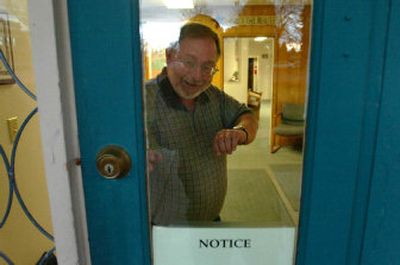Democrats blue in red county

Kootenai County government has lost its donkey mojo.
Only two Democrats filed for the six county offices on the ballot this year.
Clerk Dan English is used to the title of the county’s lone Democratic official but wouldn’t mind some company. Yet the party faithful aren’t sure how to get more Democrats to vie for county seats.
“I’ve scratched my head on it, but I really don’t have an answer,” English said.
Democrat Dan Duffey, of Rathdrum, is the other Democrat to sign up, entering the county treasurer’s race against incumbent Republican Tom Malzhan.
Party leaders don’t have a clear hold on why Democrats prefer state legislative races, leaving the county slots for the Republicans to fight over.
The most obvious Democratic omission is in the two high-profile races for county commissioner.
Republican Commissioners Katie Brodie and Gus Johnson both have Republican challengers but no Democratic opponents. Independent Tom Macy entered the race against Johnson at the last minute on Friday. Post Falls City Councilman Todd Tondee also is making a bid.
Brodie is facing Republican Rich Piazza, who is taking a third shot at a commission seat. With only Republicans in the race, voters will decide the outcome of this race in the May 23 Republican primary.
Yet there’s only one seat in all of the House and Senate races in the three legislative districts that comprise Kootenai County that doesn’t have a Democrat contender. That’s the District 3 House race between Rep. Phil Hart, R-Athol, and former Rep. Wayne Meyer, R-Rathdrum.
English’s theory is that it’s a lot more work to run a countywide race that encompasses the equivalent of 3.5 legislative districts. County races also have gotten more expensive, with Brodie’s 2004 campaign setting a record of more than $26,000.
That’s close to the same range of cash seen in the local legislative races the same year, and often the Democrats had the larger war chests.
Another possible factor is that the county jobs are full-time, meaning candidates would have to give up their current careers, unlike people who run for posts as part-time citizen legislators.
Then there’s the high-profile status and stress that comes with the county commission jobs.
Brodie wonders if there’s a perception of prestige or pecking order that boosts the attraction of the legislative gigs.
She admits that commissioners often have to have thicker skin because they are in the newspaper almost daily.
“We’ve got a finger in so many more pies,” she said. “That’s the reality of it. Issues that affect every walk of life are solved right here in this building, from parks and waterways to garbage, tax bills and planning.”
The 2002 election was the last time a Democrat other than English ran for a county seat. There were two Democratic candidates in 2000.
Democrats started losing influence and seats in North Idaho in the 1990s. That’s about the same time the area’s population started to soar.
Kootenai County Republican Central Committee Chairwoman Donna Montgomery said the lack of Democrats in office, and on the ballot, reflects the mind-set of voters.
“This county was heavily Democrat but apparently the residents here weren’t happy with that,” Montgomery said.
Unlike some speculators on the issue, Montgomery doesn’t think money is the problem.
“If they wanted money they could find it,” she said.
Bill Kersting, the Kootenai County Democratic Central Committee chairman, supports the money argument and thinks cash is a big component keeping Democrats off the county ballot.
He said Republicans usually garner the support of businesses while Democrats must rely on individual contributions from voters. That means Democrats have to start campaigning earlier and often work harder.
Kersting himself opted to run for the Idaho House instead of a county office. He is running against Republican Rep. Jim Clark, of Hayden Lake, and Hayden City Councilwoman Jeri DeLange.
The lack of candidates doesn’t mean there aren’t Democrats in Kootenai County, Kersting said. There are several thousand people on the local party’s mailing list.
Retired Coeur d’Alene firefighter Chuck Thomas went to the local Democratic Party, fed up and wanting to run for office to support the working man. When he asked which position he should tackle, officials pointed him to a Senate seat in Post Falls.
He thinks that legislators have more power than county officials.
“The county has to go by what the state says,” said Thomas.
He said it’s a shame more Democrats aren’t willing to try to get planted in county government, a move that would help strengthen the party overall.
Thomas, like others, keeps waiting for the political pendulum to eventually swing back and the Democrats to regain their power.
The question is how long will it take.
Until then, English – running unopposed – is happy to act as the token Democrat. And like the mythical Maytag repairman who’s always waiting for a customer, English is always hoping a left-leaning politico will walk through the door asking for directions on how to run for office.